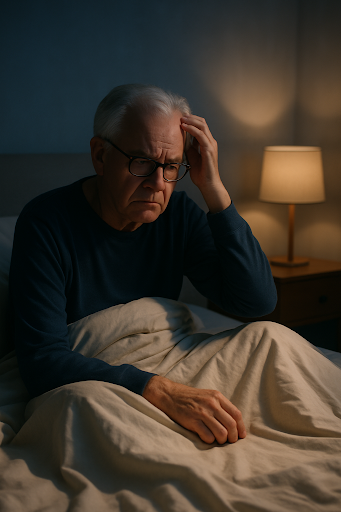As we age, many things change—our bodies, our metabolism, and yes, even our sleep. Sleep disorders become more common after age 50, and a good night's rest for many seniors becomes elusive. If you’ve found yourself lying awake more than you used to, or waking up too early feeling unrested, you’re not alone.
🌙 Why Does Sleep Change After 50?
Several factors contribute to disrupted sleep in older adults. Physiologically, our circadian rhythms tend to shift, making us feel sleepy earlier in the evening and wake up earlier in the morning. Additionally, the production of melatonin, the hormone responsible for sleep, decreases with age.
Several factors contribute to disrupted sleep in older adults. Physiologically, our circadian rhythms tend to shift, making us feel sleepy earlier in the evening and wake up earlier in the morning. Additionally, the production of melatonin, the hormone responsible for sleep, decreases with age.
💤 Common Sleep Disorders in Seniors
- ✔️Insomnia: Difficulty falling or staying asleep.
- ✔️Sleep Apnea: Breathing interruptions during sleep, often undiagnosed.
- ✔️Restless Legs Syndrome (RLS): Uncomfortable sensations that prompt leg movement.
- ✔️REM Sleep Behavior Disorder: Acting out dreams, more common in older males.
- ✔️Insomnia: Difficulty falling or staying asleep.
- ✔️Sleep Apnea: Breathing interruptions during sleep, often undiagnosed.
- ✔️Restless Legs Syndrome (RLS): Uncomfortable sensations that prompt leg movement.
- ✔️REM Sleep Behavior Disorder: Acting out dreams, more common in older males.
🧠 The Effects of Poor Sleep on Health
Chronic sleep deprivation in seniors is linked to memory decline, depression, weakened immunity, and an increased risk of falls. Sleep is essential for brain health, emotional regulation, and physical well-being, especially after 50.
Chronic sleep deprivation in seniors is linked to memory decline, depression, weakened immunity, and an increased risk of falls. Sleep is essential for brain health, emotional regulation, and physical well-being, especially after 50.
🔍 What Causes Sleep Disruption in Older Adults?
- 🔸Chronic pain (arthritis, back pain)
- 🔸Frequent urination at night (nocturia)
- 🔸Medication side effects
- 🔸Stress, anxiety, or depression
- 🔸Lack of daytime activity or sunlight exposure
- 🔸Chronic pain (arthritis, back pain)
- 🔸Frequent urination at night (nocturia)
- 🔸Medication side effects
- 🔸Stress, anxiety, or depression
- 🔸Lack of daytime activity or sunlight exposure
🌿 Gentle Strategies for Better Sleep
Medication isn’t the only solution. Many seniors improve their sleep naturally through small daily adjustments:
- 🌅Stick to a schedule: Go to bed and wake up at the same time every day—even on weekends.
- 📱Limit screen use: Turn off devices at least an hour before bedtime.
Medication isn’t the only solution. Many seniors improve their sleep naturally through small daily adjustments:
- 🌅Stick to a schedule: Go to bed and wake up at the same time every day—even on weekends.
- 📱Limit screen use: Turn off devices at least an hour before bedtime.
- 🕯️Create a calm bedtime routine: Gentle music, reading, or meditation helps signal your brain it's time to wind down.
- 🚪Keep your room cool and quiet: Darkness and silence promote deeper sleep.
- 📖Seek therapy: If anxiety or grief is affecting your sleep, cognitive behavioral therapy (CBT) may help.
🌟 When to See a Doctor
If sleep issues persist for over a few weeks or affect your daily life, speak to a healthcare professional. In some cases, sleep studies may be needed to rule out underlying disorders like sleep apnea.
If sleep issues persist for over a few weeks or affect your daily life, speak to a healthcare professional. In some cases, sleep studies may be needed to rule out underlying disorders like sleep apnea.
💬 Final Thought
After 50, restful sleep is not a luxury—it’s a necessity. By understanding your sleep patterns and making mindful changes, you can reclaim your nights and wake up refreshed. Remember: It’s never too late to sleep well.
After 50, restful sleep is not a luxury—it’s a necessity. By understanding your sleep patterns and making mindful changes, you can reclaim your nights and wake up refreshed. Remember: It’s never too late to sleep well.

